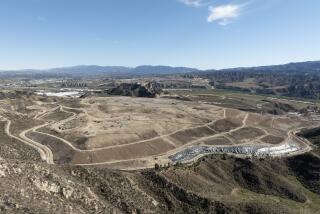LAKE VIEW TERRACE : Glitches Warned in Methane Conversion
- Share via
A city-hired consultant has warned that an unexpected glitch may make a planned methane-to-electricity plant at Lopez Canyon Landfill unprofitable.
Although the plant will be powered by the methane gas produced by decomposing trash buried in the 392-acre landfill in Lake View Terrace, it will require a natural gas “boost” to keep the generator operating at peak efficiency because the amount of methane seeping from below ground decreases over time, according to Drew Sones, manager of the Los Angeles Bureau of Sanitation’s Recycling Division.
The consulting firm CSI Resource Systems Inc. of Boston has said the cost of natural gas will escalate at too steep a rate, eventually eating up any profit margin, Sones said.
The problem is not so much the initial price of the gas, Sones said, but a price escalation of 4.5% per year. The price of the electricity to be sold by the plant only escalates at 2.5%. “At some point, those two will cross,” he said.
The consultants predict that profits won’t become losses until about 15 years into the plant’s expected 30-year life span, he said.
Even so, the company attempting to build the plant, Lopez Canyon Energy Partners L.P., now must attempt to get a better deal on the natural gas, possibly by offering a natural gas company some stake in the plant, according to Sones.
Tudor Williams, a member of the partnership and project manager for the plant, said Thursday that he is negotiating with at least one gas company and may have resolved the issue.
The plant itself is expected to generate very little profit, if any, Williams said. But federal tax incentives offer its owners lucrative credits worth $12 million to $14 million over the lifetime of the project, he said.
The city administrative office and Bureau of Sanitation have been examining the proposal since September to ensure that it is technologically and financially feasible, said Richard Hart, principal administrative analyst.
At stake for the city are about $1 million per year in revenues or reduced costs, cheaper electrical rates and a chance to convert an air pollution nuisance to good use.
Faced with complaints from nearby residents and fines from environmental agencies, the city three years ago began channeling and burning off the methane seeping from trash buried at the landfill, slated for closure in February, 1996. Methane is a natural byproduct of trash decay.
The city plans to buy all of the electricity generated by the 30-megawatt plant and also receive at least a 21% royalty on all plant revenues.
Hart said he should complete his analysis of the project, with the partnership’s response to the gas price issue, within a few weeks. It then goes to the mayor’s office and City Council.
More to Read
Sign up for Essential California
The most important California stories and recommendations in your inbox every morning.
You may occasionally receive promotional content from the Los Angeles Times.














